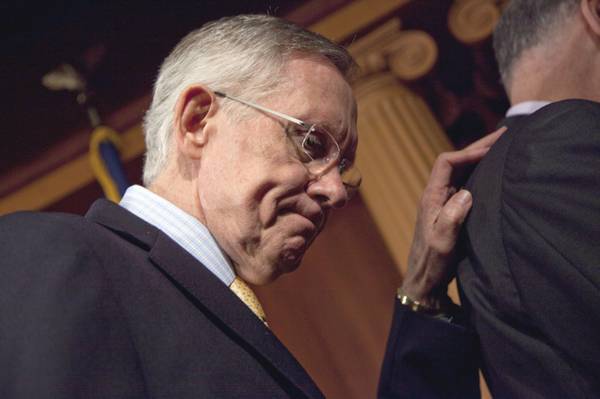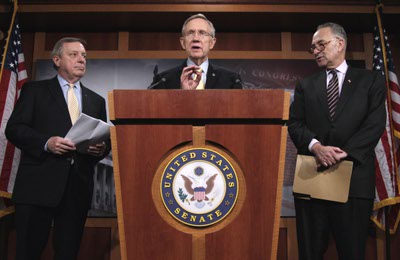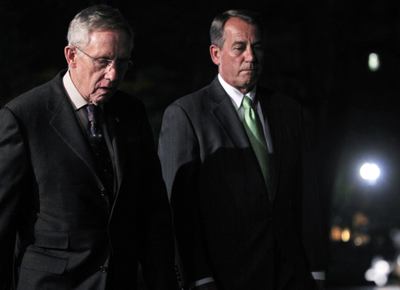Sun Coverage
WASHINGTON - It’s either some very subtle political posturing, or it seems like we’re headed for a shutdown.
Senate Majority Leader Harry Reid sounded disheartened when he spoke on the Senate floor this morning to give an update on the status of negotiations.
“The numbers are basically there,” Reid said. “But I am not nearly as optimistic -- that’s an understatement -- as I was 11 hours ago.”
The fate of the possible midnight Friday government budget is coming down to two final issues, Reid said this afternoon: women and air.
He’s referring specifically to riders that the GOP put on its budget, H.R. 1, that would prohibit federal funding of Planned Parenthood and strip the Environmental Protection Agency of its ability to make rules about climate change.
“The only things – I repeat, the only things – holding up an agreement are women’s health and clean air,” Reid said. “This is a bill to keep the country running. It’s not a women’s health bill. It’s not an environmental bill. We will not solve in one night disagreements this country has been having for 40 years. That is not realistic. Right now, we have to be realistic.”
Reid, House Speaker John Boehner and President Obama have been alternating between phone calls and in-person conferences to try to work out a budget deal.
While this morning there was still a solid day and a half left until the clock struck that point, there’s got to be ink on paper for the House and Senate to approve a final resolution -- and that means there’s barely any time left.
The triumverate has faced a series of hangups: first, the figure of the cuts. Democrats and Republicans appeared to have agreed on a figure of $73 billion below the president’s initial fiscal 2011 request, or $33 billion off today’s spending levels. But that momentum ground to a halt as lawmakers reached an impasse over where to cut -- and what might come along for the ride.
To Reid, the protracted disagreements are about riders. To Boehner, it’s about cutting spending.
So why can’t the two match up? First of all, because they haven’t been able to agree upon a number. While it appeared the two had settled on the $33 billion figure earlier this week, House Republicans are now pushing for $7 billion more -- and appear to be leveraging that by leaning on Democrats to adopt their riders on Planned Parenthood and the EPA -- areas where the Democrats say they won’t budge.
Compromise likely rests on being able to make a deal for the extra dollars, or on Boehner deciding that a shutdown would be too politically costly (at present, polls -- and even Boehner himself, seem to favor the idea that Democrats would win the PR war if the government actually goes dark tomorrow at midnight).
But Reid said Thursday he no longer thinks Boehner is negotiating in good faith, and is gunning for a shutdown.
Reid is meeting with Boehner again at the White House early this afternoon to try to hash out those differences. But time’s wasting -- if they can’t come out of this meeting with an agreement, there may be no agreement in time.
Among the riders Republicans have tried to include are cuts in funding to National Public Radio, Planned Parenthood, Head Start, low-income housing benefits and the Environmental Protection Agency’s ability to regulate greenhouse gases and issue rules on climate change -- a topic the House and Senate both considered in various forms as a series of independent bills Wednesday. No surprise that the House passed its version, while the Senate voted down all four measures to restrict the EPA’s authority that appeared before it.
All of those provisions, Reid has said, are non-negotiable non-starters -- as is the idea of another short-term funding resolution. Earlier this week, Republicans floated the idea of short-term patch that would fund the Defense Department through the end of the year, but the total budget for just a week to buy negotiating time. Democrats, who have been insisting that the Defense Department sustain cuts along with all the discretionary spending programs Republicans are targeting, dismissed it out of hand.
But in the last 48 hours, even what baseline for an agreement that existed fell off the table. Republicans, under pressure from the Tea Party wing of the party, upped their demand: from $73 billion to $80 billion. That’s still lower than what the Tea Party members want, which is $100 billion off the fiscal 2011 levels, but now higher than what Boehner initially requested the government cut when negotiations began (he had asked for $73 billion).
It doesn’t add up to a promising picture, especially given that it seems as much energy is being taken up by the blame game as by hammering out a compromise.
Reid and the Senate Democrats have said blankly and often that Republicans are being blindly and wrongly steered by the “extreme” Tea Party wing of their party.
“Republicans and the Tea Party continue to reject reality and insist instead on ideology,” Reid said earlier this week. “The Republican leadership ... has to decide whether it will do what the Tea Party wants it to do, or do what the country needs it to do.”
But those Tea Partyers are throwing the dirt right back. A strong contingent of freshmen House Republicans have pointed an accusing finger at Reid, in writing.
“With all due respect, if you do not plan to fulfill your responsibilities as Senate majority leader, perhaps it is time to step aside,” read a letter penned by more than 80 Republicans, asking Reid to move on a spending bill.
Interestingly enough, Nevada Republicans Joe Heck and Dean Heller were not among the signatories.
Heller and Heck, while voicing approval and voting for most of the House Republicans’ budget initiatives, have steered clear of pointing the finger the at the otherwise-vilified majority leader across the Capitol -- even when they’ve sided with the House freshmen who are leading the charge.
The only thing either has said publicly about Reid and his budgeting ideas has been positive. It was, granted, all the way back in late February when shutdowns were first being seriously discussed, when Heller said he thought Reid’s idea of buying time through short-term continuing resolutions wasn’t a bad idea.
Many things have changed since then, of course, though it seems their positions are still in parallel. Reid no longer thinks more short-term resolutions are a good idea. Heller started voting against them three weeks ago, when he broke with Boehner and refused to support the speaker’s last stopgap funding measure. But he’s since steered clear of casting directed aspersions or blame.
Some, like Nevada Rep. Shelley Berkley, still think leaders will strike an 11th-hour deal, if for no better reason than that shutting down the government only adds, in the long run, to the expense of running the country, and thus won’t reflect well on leaders of either party.
Lawmakers, who thought they were going to be headed home after voting today, were told this week by their party leaders to stick around to expedite the budget through if things come to a resolution.
But the climate around Capitol Hill has turned into one of distinct preparation for a shutdown.
If the federal government does shutter its doors, there will be a few palpable changes. First of all, museums will close (but not the Capitol), and government employees in non-essential and non-necessary positions should brace for being furloughed. (Congressional offices are still working out exactly who is “essential” and “necessary”.
The mail will still go through and Social Security checks will still be delivered -- at least that’s what happened during the last federal government shutdown in 1995, which, clocking in at 17 days, also happens to be the longest on record.
But specialized social services that don’t rely on their own, independent trust funds may not be so lucky. Veterans are probably out of luck, for instance, on their benefit checks for the duration of the shutdown. And if you’re a new applicant for any federal social service that was planning on a first check to arrive -- don’t.
The severity of a shutdown will ultimately depend though on how protracted it is. The current pace of emergency shuttle diplomacy working right now between the House and Senate and White House -- and the fact that they are actually, only a few billion dollars away from an agreement -- suggests that if there is a shutdown, it may not be for very long.






Join the Discussion:
Check this out for a full explanation of our conversion to the LiveFyre commenting system and instructions on how to sign up for an account.
Full comments policy